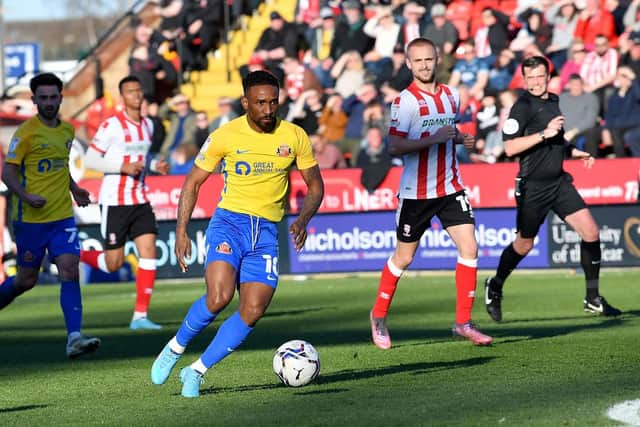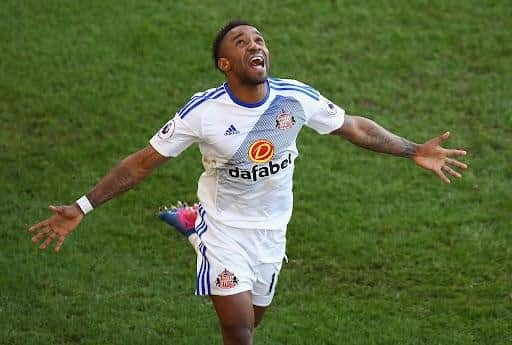Jermain Defoe's surprise decision explained - and the major questions it leaves for Sunderland
and live on Freeview channel 276
“Do you just know when it’s time?” Now, he did.
The aches and pains in the mornings, the hard to define but absolutely clear feeling that what once came easily had now gone.
And so seven (hopefully ten, of course) games out from the end of the campaign, Defoe called time on what had been an emotional return to Sunderland.
Advertisement
Hide AdAdvertisement
Hide AdJust days previous, he had been inches away from the kind of moment that brought him back in the first place.
Patrick Roberts drove through the middle of the pitch and found Defoe just outside the box. The defender got just too tight, and there for a moment was one of the Premier League’s most ruthless strikers. A quick turn into space, and a long-range effort that flashed just wide of the far post.
It would have been a crucial goal, and an electric moment. Which, after all, was the whole point of the enterprise. That Defoe could recapture some of that former glory, and along the way help light a fire under a club and fanbase enduring another challenging campaign in the third tier. One last dance.
Perhaps the most frustrating aspect of Defoe’s decision to retire was that from those challenging beginnings, there were signs that perhaps there could yet be one of those golden moments between now and May.


Advertisement
Hide AdAdvertisement
Hide AdDefoe has candidly admitted that the period leading up to his Wearside return, where high-intensity training was virtually non-existent, left him playing catch up.
In those early appearances, you could see it.
Head Coach Alex Neil spoke bluntly on the matter in mid-February: “At the moment, he’s playing catch-up, and we’re running out of games rapidly.
“It’s really difficult for him to come in and show what we know he’s always been capable of over the course of his career."


From there, though, the 39-year-old looked to be improving.
Against Fleetwood Town his presence and intelligent running helped turn the tide of a game that was fast drifting away from Sunderland. It was enough to earn a start in the next game against Crewe Alexandra and even Sunderland’s performance that afternoon did little to bring him into the game, those all-important match minutes were slowly but surely beginning to build up.
Advertisement
Hide AdAdvertisement
Hide AdNow Sunderand are facing their worst-case scenario as a defining month draws ever closer.
It was a risk to bring Defoe back, and Lee Johnson knew it. The closing stages of the January window became acrimonious when in a press conference he was asked if he personally wanted to get the deal done. Where many expected a simple and effusive answer, the response was long and unmistakably cautious.
It was not, as suggested, that Johnson did not want to bring Defoe in. He knew the quality the striker still possessed, and the impact his stature and professionalism could have on a predominantly young squad.
Johnson’s concern was over match fitness and that fundamentally, he did not address the club’s key striking issue at that stage: ensuring there was natural cover and competition for Ross Stewart, as the consequences of an injury to the talismanic Scot were unthinkable. Defoe’s return would have been welcomed, but the then head coach would have been eager to see another forward arrive.
Advertisement
Hide AdAdvertisement
Hide AdHis departure was not related to this difference of opinion, the club’s hierarchy increasingly concerned by the team’s underlying performances and forced into action after a fourth heavy defeat on the road of the season at Bolton Wanderers. There is absolutely no doubt, however, that his departure accelerated Defoe’s return.
It brought a blaze of positive publicity, and shifted a significant number of tickets for a game against Doncaster Rovers which would in the end prove a pivotal moment in the collapse of Sunderland’s top-two hopes.
Now Neil faces the challenge that Johnson ultimately feared. Sunderland remain an injury to Stewart away from having to reconfigure their game plan almost entirely. They are stacked in the wide areas and in attacking midfield, but have precious little cover in arguably the most important position of all.
Defoe alluded to the return of Nathan Broadhead from injury as one reason for his decision, and the fate of this promotion push will rest in no small part on there being no adverse reaction to the hamstring injury which has sidelined the outstanding Everton loanee for all but one game since Christmas. Defoe will no doubt have known Broadhead's return would significantly squeeze his game time, but there are no guarantees the 23-year-old will make a seamless return.
Advertisement
Hide AdAdvertisement
Hide AdSporting Director Kristjaan Speakman brought Jack Clarke to the club in January in part because he had been impressed with his occasional performances up front for Spurs U23s, and because he felt it was a role he could replicate on Wearside when required. The indications so far from Neil are that he does not share this opinion, even if he rates the 21-year-old highly as a winger.
It was high risk to bring Defoe back as the sole striking addition on deadline day, and this early retirement will underline the focus on that January strategy if the club do not manage to get over the line. Roberts and Clarke are fast improving, Jay Matete has made a promising start and there may yet be time for Danny Batth to build on his strong debut. But in allowing Tom Flanagan, Denver Hume and Aiden O’Brien to depart without direct replacements big gambles were taken, and Defoe’s retirement has raised the stakes even further.
There will rightly be disappointment that the striker will not see the campaign out, amongst both hierarchy and fanbase. Though he was holding extensive discussions with friends and family over the weekend he trained as normal at the start of the week, and so reports that this decision were imminent came if not as a total bolt from the blue then something of a surprise. The timing could yet leave Sunderland short at a crucial moment in their season and that will sting.
In the long run, you suspect the strength of those memories from his first spell will be the ones that truly endure on Wearside. Not just the goals, of which there were plenty and many quite glorious. Defoe’s connection with supporters was about so much more than that, the way he embraced the region, upending the conventional narrative of players of his stature seeing Sunderland as a step down. He saw the opportunity and took it on; wore the shirt with pride and forged an unforgettable connection with Bradley Lowery. An effervescent, engaging character who saw Sunderland with the hope and ambition that his supporters did, the reverence he drew was well earned.
Advertisement
Hide AdAdvertisement
Hide AdPerhaps the primary emotion today then will be sadness, that the fairytale ending will not materialise.
For the club’s hierarchy, the next six weeks just became even more important. The bottom line in the January window was to move this squad closer to the only goal of achieving promotion, and right now that is hanging by the most slender of threads.